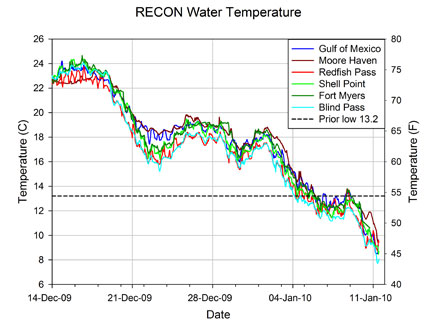Click here for details
Record Low Temperatures

Generally in the south we get 2-3 day extended cold temperatures that moderate returning to more normal seasonal temperatures soon after. Farmers had to deal with low temperatures to try to save their warm temperate-tropical crops. Record low air temperatures were recorded all over the state, for example Tampa International Airport broke a record as temperatures dipped to 27°F. The previous record low for the day was 30° in 1999. Temperatures at Plant City were at 25°F, Clewiston was at 27°F, Fort Pierce and Immokalee at 29°F and Belle Glade was at 34°F. Miami hit a new record low as temperatures dipped to 36°F, breaking the old record of 37°F, which was set in 1927. Key West also set a new record low for the day at 42°F.
Water temperatures generally take longer to drop as air temperatures decline, given the unique characteristics of water. For example, water's density in its solid form (ice) is less than its liquid form. Hence, ice floats when frozen allowing lake animals to survive below in its unfrozen depths. Water also has a high specific heat meaning it can absorb a lot of heat (energy) before its temperature rises or boils. This same process is why water temperatures lagged significantly behind the record low air temperatures, especially near the coast where the Gulf moderates changes.
The extended cold temperatures we experienced are impacting not only marine mammals, but also large and small fish as well as invertebrates. In St. Joe Bay, FL they are experiencing a major sea turtle cold stunning-event and are dealing with finding, collecting, and transporting stunned turtles to a rehabilitation facility. Locally we are dealing with significant impacts to turtles and manatees.
SCCF's RECON, now running since late 2007, early 2008 shows the extent and tempo of this rapid temperature decline. Water temperatures are lower than they have ever been since it came on line in late 2007 from Moore Haven to the Gulf of Mexico. We hit an air temperature of 32.14°F at the SCCF weather station.
We are seeing numerous dead or dying fish in Tarpon Bay by the lab (ladyfish, tarpon, pinfish, filefish, mojarra, gag grouper, mullet, catfish, among others) and are gathering information from other areas around Sanibel-Captiva. Weather forecasts are predicting rising temperatures, but as mentioned above water temperatures will lag air temperatures returning to more normal seawater conditions perhaps weeks later.
